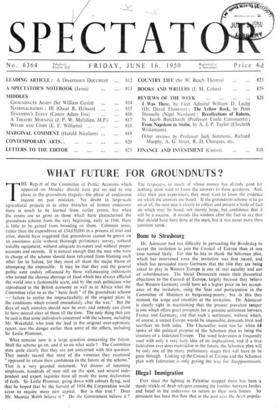WHAT FUTURE FOR GROUNDNUTS ?
THE Repi.rt of the Committee of Public Accounts which appeared on Monday should have put on end to one phase in the groundnuts tragedy—the phase of continuous
inquest on past mistakes. No doubt in large-scale agricultural projects as in other branches of human endeavour there is much to be learned from earlier errors, but when the errors are so gross as those which have characterised the groundnuts scheme from the very beginning, early in 1946, there is little to be gained from brooding on them. Coinmon sense, rather than the expenditure of £34,650,000 in a process of trial and error, should have suggested that groundnuts cannot be grown on an enormous scale without thorough preliminary survey, without suitable equipment, without adequate transport and without proper accounts and records. It is natural enough that the men who were in charge of the scheme should have refrained from blaming each other for its failure, for they must all share the major blame of attempting the impossible. It may be that they and the general public were unduly influenced by those well-meaning enthusiasts who turned the chronic shortage of food which has always afflicted the world into a fashionable scare, and by the rash politicians who reproduced in the British economy as well as in Africa what the Committee refer to as the " basic fault " of the groundnuts scheme —" failure to realise the impracticability of the original plans in the conditions which existed immediately after the war." But the days of such mistakes should now be over, and nobody can claim to have steered clear of them all the time. The only thing that can be said is that some individuals concerned with the scheme, including Mr. Wakefield, who took the lead in the original over-optimistic report, saw the danger earlier than some of the others, including Sir Leslie Plummer.
What remains now is a large question concerning the future. Shall the scheme go on, and if so on what scale ? The Committee state quite clearly that they are not concerned with this question. They merely record that most of the witnesses they examined "appeared to retain their confidence in the future of the scheme." That is a very guarded statement. Yet dozens of returning employees, hundreds of men still on the spot, and several inde- pendent and expert inquiries have all made the same declaration of faith. Sir Leslie Plummer, going down with colours flying, said that he hoped that by the harvest of 1954 the Corporation would cease to require more new capital. But is this true ? Does Mr. Maurice Webb believe it ? Do the Government believe it ?
The taxpayers, so much of whose money has already gone for nothing, must want to know the answers to these questions. And, after their past experiences, they must want to know the evidence on which the answers are based. If the groundnuts scheme is to go on at all, the next step is clearly to collect and present a body of fact on which may be based, not merely hope, but confidence that it will be a success. It sounds like wisdom after the fact to say that that should have been done at the start, but it was never more than common sense.




































